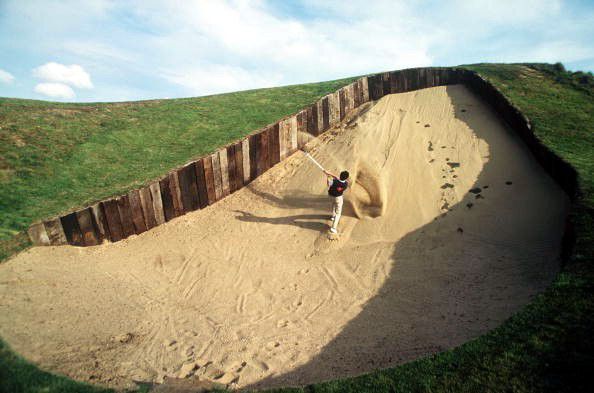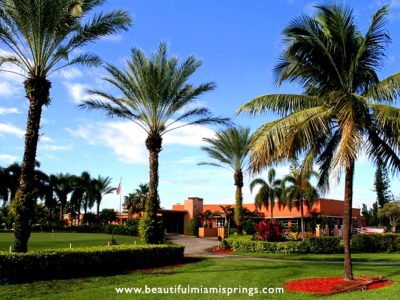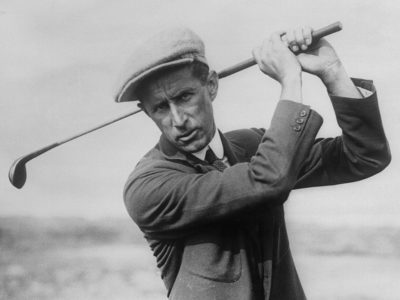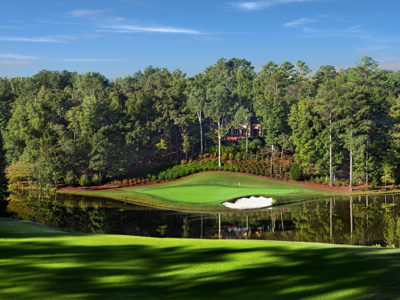By Mike May
Fast Facts About Royal St. George’s Golf Club, Site of the 149th OPEN Championship
LOCATION, LOCATION, LOCATION:
This championship links course is located in the southeast of England on Sandwich Bay with stunning views of the iconic White Cliffs, in the county of Kent. Royal St. George’s is less than a two-hour drive from London’s Heathrow Airport and even closer to London’s Gatwick Airport, making it easily accessible to international golfers.
THE GRAND OPENING:
Opened in 1887, Royal St. George’s quickly established itself as not only one of the greatest golf courses in England, but one of the best golf layouts in the world. The club was designed to be the ‘St. Andrews of the South,’ however, ‘Sandwich,’ as the locals refer to it, is more demanding and visually appealing than its Scottish ancestor.
HISTORY LESSON:
Royal St. George’s was the first golf course, outside of Scotland, to host The (British) Open Championship, when it was held there in 1894. England’s J. H. Taylor won the title. The club has hosted 14 (British) Open Championships, 13 British Amateur Championships, five British PGA Championships, two Walker Cups, as well as, the Curtis Cup.
PAST CHAMPS:
As an amateur, in 1959, Jack Nicklaus won the 36-hole Grand Challenge Cup at Royal St. George’s. Sir Nick Faldo and the late, great Seve Ballesteros each won the British PGA Championship here. American Walter Hagen, Englishman Henry Cotton, South African Bobby Locke, Scotsman Sandy Lyle, Australian Greg Norman, and Irishman Darren Clarke departed ‘Sandwich’ with the Claret Jug firmly in their hands.
CANDID CAMERA:
In 1964, Royal St. George’s was immortalized, forever, by one of its most famous members. Ian Fleming used Royal St. George’s as the setting for that classic match between James Bond and his rival Auric Goldfinger in the Goldfinger novel and movie of the same name. Though the course was referred to as Royal St. Mark’s, it was very much based on Royal St. George’s. Fleming was about to become Captain of his beloved club, when sadly he died. As a tribute, the club has the full set of Bond paperbacks on display in The Writing Room at Royal St. George’s.
ACE IN THE HOLE:
In 1967, future U.S. Open and Open Championship winner Tony Jacklin’s ace at the 16th hole, during the Dunlop Masters, was the first ever hole-in-one seen on live television.
DISTINCTIVE NAMES:
Royal St. George’s is characterized by the thatched roof shelters dotted around the course, the red cross of St. George on its pin flags, and by a number of quirky names given to a number of the course features and holes. Golfers encounter ‘The Kitchen’ at the 1st hole, the ‘Valley of Sin’ on the 4th green, ‘Campbell’s Table’ in the 5th fairway, the ‘Tennis Court’ on the 9th fairway and the ‘Suez Canal’ at the 14th fairway.
At the 1922 Open at Royal St. George’s, George Duncan, the winner of the 1920 Open Championship held in nearby Royal Cinque Ports, was closing fast on American Walter Hagen, the leader in the clubhouse with a 72-hole score of 300. Needing only a par at the last to tie Hagen, Duncan’s approach to the 18th green settled in a small hollow to the left of the green. His chip to the pin was weak, resulting in a bogey five, and a total score of 301. That depression became known as, ‘Duncan’s Hollow.’
SAND TRAP:
One of the obstacles to watch for as you view the OPEN Championship is the massive ‘Himalaya Bunker.’ It is considered the tallest in England, which is to be avoided when striking the tee shot on the 4th hole.
PLAYING TRADITIONS:
When playing golf at Royal St. George’s, having two golf balls in play with either a two-ball or foursomes are required to play this course, except on Tuesday’s when you can play a fourball. The emphasis on two balls keeps the pace of play moving along at a respectable pace.
TEE TIMES:
Despite being a private club, tee times are available for the general public at various times during the week and can be booked online at www.royalstgeorges.com. Access to Royal St. George’s is that simple, but while booking a tee time can be done online, it’s important to make a point of being ‘offline’ once you arrive on the first tee, so that you can soak in the moment.
Take A CADDY:
For average golfers playing Royal St. George’s, it is strongly recommended that one of the club’s experienced caddies be hired to add to the experience of this revered course. The caddies are a valuable source of advice on approach shots and pitches, plus can help line up putts on the tricky greens. Their amusing anecdotes about the course also add to the overall experience.
DINING:
After playing 18 holes at Royal St. George’s, stay for lunch and dine outside on the garden patio. Jacket and tie are required for a more formal roast lunch in The Dining Room.
The atmosphere and tradition of Royal St. George’s make it the “Crown Jewel of Golf in Kent.”
For more information about Royal St. George’s Golf Club, visit www.royalstgeorges.com and for more on Golf in Kent, go to www.golfinkent.co.uk.










